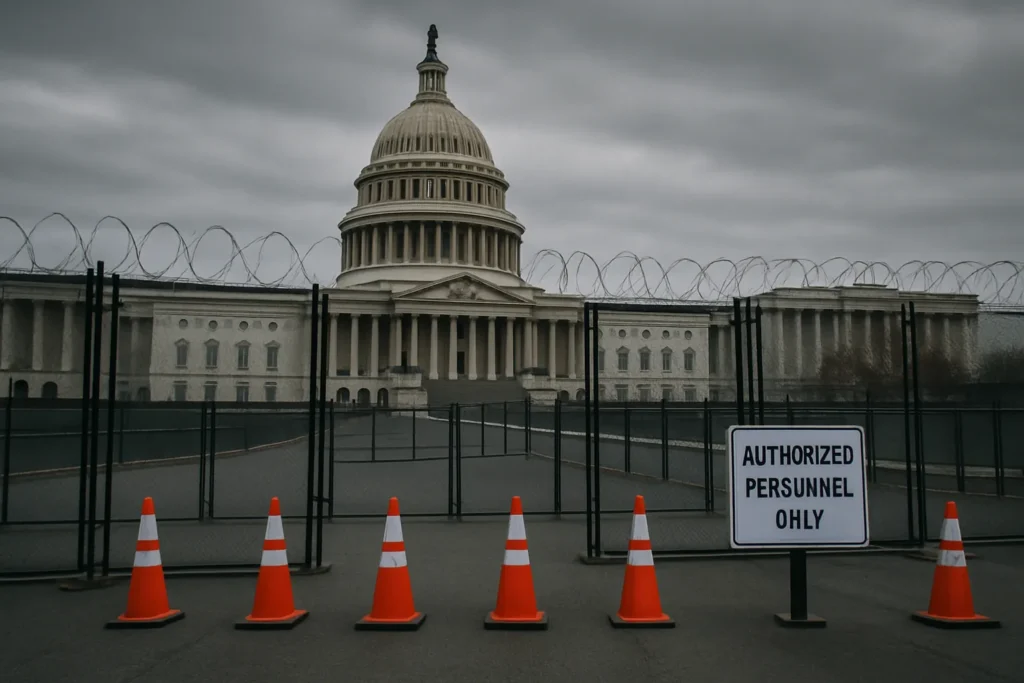Chaos at Delaney Hall: When Oversight Meets Enforcement
One Friday afternoon in Newark, a scene unfolded that exposed the volatile intersections of immigration enforcement, civil rights, and political accountability. Democratic Congress members—Reps. LaMonica McIver, Bonnie Watson Coleman, and Rob Menendez—arrived at the Delaney Hall ICE detention facility, aiming to perform an oversight visit. Newark Mayor Ras Baraka, steadfast in his role as the city’s chief executive, accompanied them. What was meant to be a routine check on the well-being and treatment of detainees spiraled rapidly into a national flashpoint following the mayor’s arrest and the explosive claims that some lawmakers physically assaulted federal officers.
Mayor Baraka was taken into custody and charged with trespassing, a charge that his supporters say amounts to the criminalization of public oversight. “This wasn’t trespass; this was oversight,” argued Baraka, echoing a sentiment expressed by many progressives who view such visits as necessary checks on often opaque federal detention practices. Yet, the Department of Homeland Security, via spokeswoman Tricia McLaughlin—a GOP-linked figure who previously advised presidential hopeful Vivek Ramaswamy—signaled that that the department is not treating this as a simple political dustup. “We’re not playing,” McLaughlin insisted. “Arrests are definitely on the table,” she warned, citing bodycam footage the department is expected to make public soon. DHS alleges that footage captures Rep. LaMonica McIver “bodyslamming” a female ICE agent and several officials physically confronting law enforcement.
This incident is hardly an isolated event; it lands squarely at the collision of state and federal tensions over immigration enforcement, already inflamed by the punitive policies and secrecy the system so often breeds. Lawmakers have a constitutional responsibility to oversee agencies that wield immense power over civil liberties, particularly when human lives—those of detainees—are at stake. The standoff at Delaney Hall is a visceral reminder that the consequences of unchecked enforcement reach straight from detainee bunk rooms to the doorstep of American democracy itself.
Competing Narratives and the Battle for Truth
The fallout has quickly escalated into dueling accounts, spurring confusion and outrage. On one side, DHS and ICE maintain that members of Congress crossed red lines—both physical and legal—by impeding a federal operation and directly assaulting an officer. The promise to release bodycam footage signals an aggressive posture, seeking to sway public opinion by putting images to incendiary claims. “We are reviewing all evidence and will proceed with appropriate charges,” McLaughlin stated, suggesting imminent further action against the congressional delegation.
Those on the ground tell a different story entirely. Rep. Bonnie Watson Coleman’s office flatly rejected the DHS’s version of events. Spokesperson Ned Cooper contends that the bodycam footage in fact reveals “ICE agents assaulting members of Congress and falsely accusing them of wrongdoing.” The lawmakers and Mayor Baraka insist that their attempts to enter Delaney Hall were lawful and fell within the bounds of scheduled oversight—performed, incidentally, on public property. Mayor Baraka, upon his prompt release, accused federal officials of targeting him for political gain while flouting the right of local leaders to inspect and ensure the safety of their own constituents. The gravity of these conflicting narratives cannot be overstated.
National advocacy groups, including the ACLU and Human Rights Watch, quickly leaped to the defense of the lawmakers and the mayor. Their argument: transparency and oversight are fundamental obligations when it comes to facilities with a history of abuse, medical neglect, and due-process violations. A closer look reveals that Delaney Hall and other ICE facilities have, for years, been the subject of disturbing reports—ranging from overcrowded conditions to lack of medical care—documented by journalistic investigations and oversight boards. According to a 2022 ProPublica expose, routine oversight visits are often stonewalled, and access is tightened whenever controversy arises. The implication is clear: pushback on oversight typically correlates with practices that cannot withstand scrutiny.
“When government agencies resist oversight, transparency is the first casualty—and accountability soon follows.”
Is it any wonder that communities most affected by ICE enforcement see these confrontations as struggles not just over access, but over basic human dignity? That DHS is aggressively pressing criminal charges against sitting members of Congress for performing oversight isn’t just rare—it’s alarming in what it signals for the fragility of American checks and balances.
A Reckoning for Immigration Oversight—and Democracy
The deeper stakes in this controversy reach beyond New Jersey, ICE, or the political fortunes of those involved. At their core is a philosophical battle over who gets to monitor institutions that routinely detain, deport, and sometimes endanger the most vulnerable among us. Do we really want a country where the alert public servant or watchdog is criminalized for demanding transparency?
U.S. history is replete with flashpoints where lawmakers have risked confrontation for the sake of justice. The lunch counter sit-ins of the 1960s; the Freedom Riders’ forays into hostile Southern bus stations; Representatives like John Lewis, who placed themselves in harm’s way to challenge injustice under color of law. Each time, entrenched interests insisted that oversight, or protest, was really nothing more than criminality or agitation. Each time, it’s the struggle for greater openness and fairness that has moved the country forward.
This episode has exposed conservative appetite for using state power as a cudgel rather than a shield—threatening those who dare to ask uncomfortable questions about the machinery of detention. According to Georgetown Law professor Paul Butler, “Holding the government to account is not just a right, it is a civic duty, especially in places where freedom is made fragile by the exercise of unreviewed authority.” Our democracy demands more—more watching, more speaking out, and, crucially, more willingness to challenge a status quo that equates oversight with trespass.
Beyond that, we all have a stake in this debate. If today’s adversaries of sunlight and scrutiny succeed in intimidating oversight into silence, tomorrow’s abuses will flourish in the shadows.

